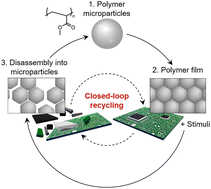Closed-loop recycling of microparticle-based polymers†
Abstract
Contemporary polymer science is shifting toward the development of recycling systems to curb global resource depletion and environmental contamination. However, most methods of polymer recycling require cleavage of chemical bonds, which diminishes the quality of the polymers during recycling. Here, we propose a recycling strategy for tough polymers based on microparticles, which allows materials recycling without loss of their properties (‘closed-loop’ recycling). The polymer microparticles can be used to generate tough polymer films by controlling the interparticle physical cross-linking, and subsequently recycled on demand by disassembling into individual microparticles without chemical reactions. Our “microparticle-based concept” for polymer recycling circumvents the infamous trade-off between mechanical stability and degradability of polymers and be expected to open new avenues for closed-loop recycling of polymer materials.

- This article is part of the themed collection: Circularity showcase


 Please wait while we load your content...
Please wait while we load your content...